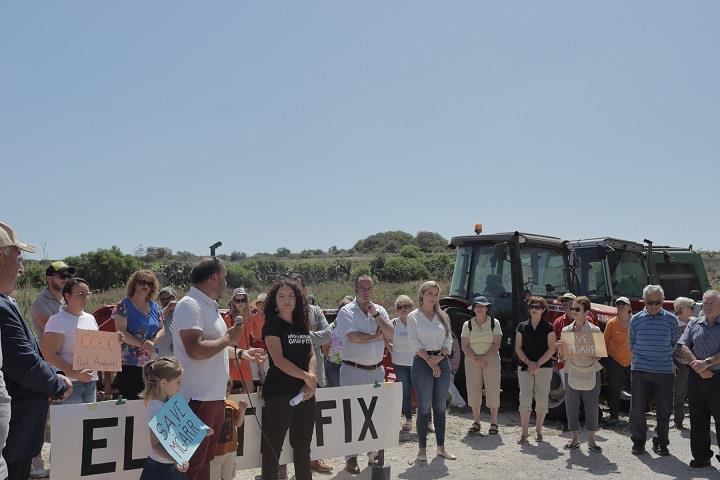Residents and farmers from Mġarr addressed a press conference to express their anger at the appeal launched by Electrofix against the decision by the Planning Authority to refuse the company’s application to construct a sprawling solar farm on arable land in the village.
In a statement issued by Moviment Graffitti, which organised the event, it was said that participants were concerned with two issues:
-
The presentation of new plans at the appeal stage is unacceptable, since the appeal is meant to cover the same plans that were initially presented to the Planning Board. The appeal is a legal process in which a person or company appeals to the Tribunal against the decision of the PA, which in this case refused the application. During the appeal, new plans cannot be presented.

Residents also expressed their concerns about the prominent presence of Electrofix at the Agrifair currently in Ta’ Qali, despite the fact that the company does not operate in the farming sector. The fact that Electrofix is trying to depict its activities as agricultural ones, when this is clearly not the case, is highly suspect and a worry to several farmers.
The proposed development in Mġarr would involve the construction of solar panels atop greenhouses, a massive project occupying around 38 tumoli or six football pitches’ worth of arable land on ODZ. This area is also characterised by traditional rubble walls, carob trees, garigue, protected flaura and fauna, bee colonies, as well as archaeological remains from the Punic and Roman periods.
The project goes counter to the provisions of the document that regulates solar farms in Malta - Solar Farms Policy 2021 - which clearly states that they cannot be built on agricultural and natural land.

Farmers present explained that the solar panels would be detrimental to the growth of any produce, since their installation would mean that the fields would not be exposed to direct sunlight and would instead fall in the shade.
An archaeologist explained that the project is located in an area of high archaeological importance in Mġarr, with several archaeological remains at its outskirts. The project would also cause run-off rainwater that would otherwise have been absorbed by soil to flow directly down to the Ta’ Haġrat neolithic temples.
More than 1,200 objections to the project were submitted to the PA.

Development on ODZ land cancels out any notion that a project such as this one is intended to contribute towards the reduction of carbon emissions. It is also likely that this application is simply an excuse to develop virgin land that would otherwise be difficult to get a permit to build on.
Solar panels should not be placed on arable land but on the roofs of government and industrial buildings, amongst others, the protesters argued. It is ridiculous to think of 38 tumoli of fields in the Maltese countryside as wasted space, when there are plenty of other locations far better suited to generating solar energy.

